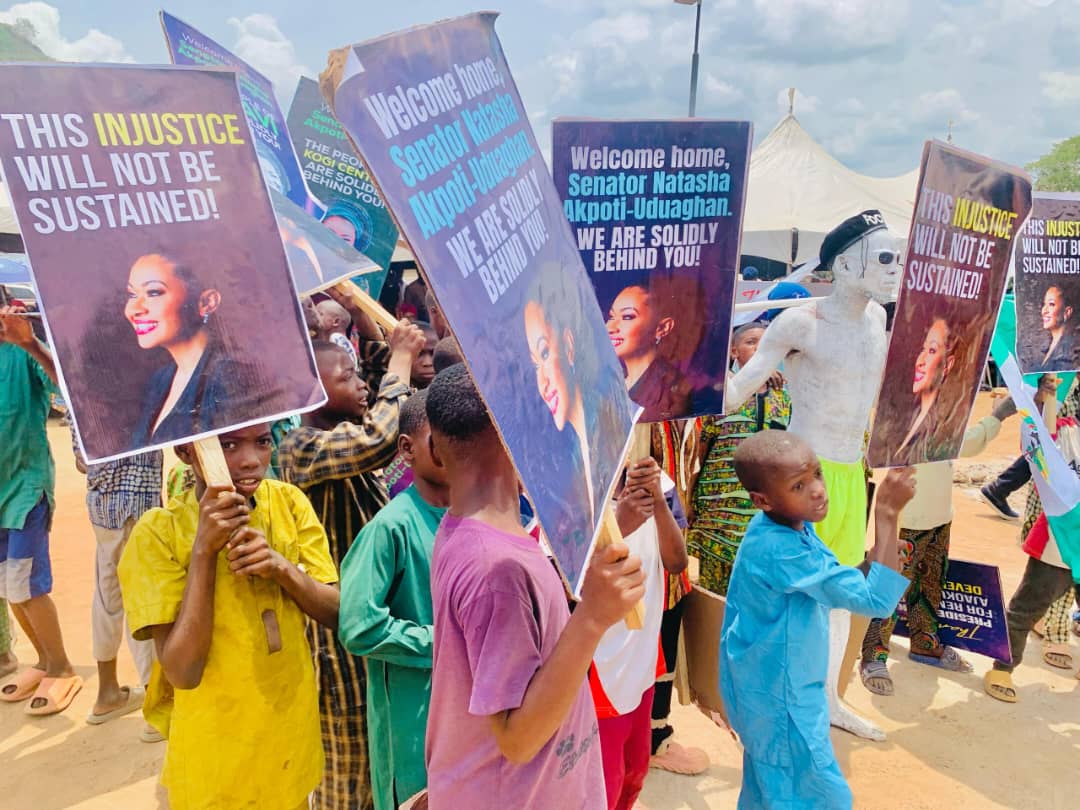News
Legislative agenda: Gbajabiamila lists successes, challenges of 9th House

The Speaker of the House of Representatives, Hon. Femi Gbajabiamila has highlighted some of the achievements recorded by the 9th House in its legislative agenda, with six months to the end of the tenure.

Gbajabiamila said the 9th House has done a lot, which was a clear departure from what obtained in the past, adding that “the last four years have been a period of consequential interventions and essential reforms that lay the foundation for future growth and prosperity. We must acknowledge this and draw lessons to guide us in the future.”

Gbajabiamila spoke when he delivered a paper titled ‘Delivering on our contract with Nigerians: Implementing the Legislative Agenda of the 9th House of Representatives – Progress, Challenges and the Way Forward’ at the Second Edition of the Distinguished Parliamentarian Lecture Series organized by the National Institute for Legislative and Democratic Studies (NILDS) in Abuja on Monday.
He said the 9th House has been an unusually productive parliament despite the limitations imposed by the Covid-19 pandemic.
“We have taken legislative action to address longstanding challenges of governance and economics in our country. We have passed landmark legislation to fix our oil and gas industry, reform the police and reorganise the corporate administration system in our country.
“We have considered and passed meaningful legislation impacting all areas of our national life. Some of these bills are the Police Service Commission Act (Repeal and Re-enactment) Bill, the Electric Power Sector Reform Act (Amendment) Bill, and the Deep Offshore and Inland Basin Production Sharing Contracts Act (Amendment) Bill, amongst others.
“We passed a slate of bills to reform the aviation sector and clean up our airports so that these critical national assets can be properly administered to the best expectations of the Nigerian people. We have reformed the annual budget process of the Federal Government. We have used the appropriations process and the power of parliament over the public purse to pursue community and constituency development across the country.
“We have invested in primary, secondary, and tertiary education infrastructure. We have provided ICT training centres to facilitate learning and enhance educational outcomes. There is virtually no constituency in the country that hasn’t benefited from significant investment to improve primary healthcare, rehabilitate classrooms and schools, and provide community roads,” Gbajabiamila said.
In the area of critical interventions, Gbajabiamila said the House intervened to help resolve outstanding issues between the Academic Staff Union of Universities (ASUU) and the Federal Government “so our young people could return to their academic pursuits after an extended period of industrial action by the union.
“Since then, the House of Representatives has worked to address the issues that led to the strike. We are currently working on the 2023 Appropriation Bill, which includes the sum of N170 billion to provide a level of increment in the welfare package of university lecturers. The Bill also includes an additional N300bn in revitalisation funds to improve the infrastructure and operations of federal universities.”
Furthermore, Gbajabiamila said, the House convened the Accountant General of the Federation (AGF), the Academic Staff Union of Universities (ASUU) and other stakeholders to facilitate the adoption of elements of the University Transparency and Accountability Solution (UTAS) into the Integrated Payroll and Personnel Information System (IPPIS).
“This effort is being supervised by the Chairman of the House Committee on Tertiary Education, Rep. Aminu Suleiman. Now, these issues are the fundamentals that have been at the heart of the perennial agitation by the union.
Having addressed those, we are now motivated to focus on addressing the issues of funding, education standard, and student and staff welfare that are necessary to build twenty-first century tertiary institutions worthy of their name.
“This is the reason why just a few weeks ago, we convened a National Summit on Tertiary Education Reform (NSTER) that brought stakeholders together for two days to conduct a holistic review of the tertiary education sector in the country and make recommendations for necessary action to improve the sector. This and other interventions in the education sector are a critical component of our Legislative Agenda commitments to strengthening human capital development by providing access to quality education opportunities across the country.”
By outlining some of the many achievements of the 9th House, the Speaker said it was not his intention to take a victory lap of any kind.
“Our system of policing and the judiciary, our infrastructure and public services, and so many areas of our national life still fall far short of our best aspirations. We have made improvements to our electoral laws to enable far-reaching reforms to improve the process through which we elect political leaders. Yet, we still need to improve the internal process of nominations within the political parties.
“The amendment of the Police Act 2020 put in place a new system for reporting, investigating and sanctioning abuses of police power, yet such incidents persist across the country. Though much has been done, much yet remains to do to deliver our people from the degradations of poverty and lack, protect them from the machinations of criminals and terrorists, and reform our politics and government to better reflect the best of who we are and be more responsive to the obligation to be a catalyst of national development.”
Gbajabiamila said, “the biggest challenge of implementation we have encountered with the Legislative Agenda is one that often imperils reform efforts worldwide: the refusal to embrace change. Both consciously and otherwise, there usually is institutional resistance to fundamental changes in policy and processes in the public sector. This is compounded by the number of constituencies whose interests, concerns and expectations must be factored in and managed.
“We have three hundred and sixty members in the House of Representatives from nearly a dozen political parties. We have the National Assembly Service Commission (NASC) as the parliamentary civil service with thousands of personnel, a multitude of political and policy aides, and so many other interested parties, many of whom may be used to doing things differently. Time and careful management are indispensable components of successful reform in arenas like this.
“Then you have the issue of competing objectives. How do you set a Legislative Agenda that adequately captures the priorities of constituents in Surulere, Nnewi, Daura, Gubio, Ogoja and Wase at the same time? How do you assure the members representing these diverse constituencies that the priorities of their constituents won’t get lost in a streamlined, collaborative, and coordinated approach to legislative policymaking? How do you bring the Senate and the Executive along when you have managed to ensure that the House is committed to the same priorities and rowing in one accord to the same destination?”
Going forward, Gbajabiamila said the House of Representatives, in its future iterations, should continue the agenda-setting, prioritisation, monitoring and evaluation model of legislative policymaking embodied in the Legislative Agenda of the 9th House.
He noted that the Committee on Monitoring and Implementation of the Legislative Agenda should become, in the new parliament, a standing committee fully funded to serve as the in-house think tank, policy coordinator and delivery unit of the House.
“We need to adopt a new system of vetting legislative proposals for quality control and compliance with legislative agenda priorities. Amendments to the Standing Orders of the House will be required to achieve this.”
“The design of future Legislative Agendas needs to be more collaborative to aid implementation. Efforts must be made ab-initio to harmonise competing priorities of the various interests and stakeholder groups and align the different arms of government towards the same goals.
“Whatever the political settlement that emerges after the 2023 general elections, all concerned must recognise that government cannot afford to be at cross-purposes with itself. This doesn’t mean that we must all agree on what needs to be done and the process of getting things done. But we must make concerted efforts to identify areas of agreement and work on those together whilst seeking accommodations in other areas that allow us to advance little by little.”

News
Rivers Police nab church overseer over homosexual allegation

A popular General Overseer of a new generation Church, Elijah has been arrested by the Octopus (C41) Strike Force unit of Rivers State Police Command for investigation over homosexual allegations.

It was gathered that a video of the Pastor was leaked indulging in the homosexual act to the police by a member of his church.

The member who alleged that the General Overseer attempted sleep with him against his will.
The member who revealed his name simply as Patrick now a complainant said, he wanted to play along after the General Overseer made sexual advancement and captured the nude video of pastor attempting to have carnal knowledge of him.
Armed with the intelligence report, the police traced the General Overseer who is from Rivers State to one of his relaxation spots in Port Harcourt and arrested him.
Sources revealed to our correspondent that the General Overseer has reportedly confessed to other numerous acts of homosexuality involving both male adults and minors within and outside Port Harcourt.
Public Relations Officer for the Rivers State Police Command, SP Grace Iringe-Koko, confirmed the incident, adding that investigation was ongoing.

News
BREAKING: Constituents defy ban, troop out to receive Senator Natasha [Pictorials]

Against government ban on rallies and organised reception under whatever guise by Kogi State Government, constituents of the Central Senatorial District troop3d out enmasse to receive Senator Natasha Akpoti-Uduaghan on Tuesday in Okene.

According to the pictorials released by the Media office of Senator Natasha, creme-de-la creme could be seen waiting in a scorching sun, not minding the effect.

The massive turn out followed assurance from Senator Natasha ‘s media team that the lawmaker has arrived from overseas and would make it to Okene on Tuesday for Sallah celebrations with her constituents.
A statement obtained by CAPITAL POST in Lokoja on Tuesday, pointed out that the purported ban on rallies and the cancellation of the visit were mere rumours, hence, the embattled lawmaker would pay a visit her constituents.
Part of the statement read: “We are pleased to confirm that Senator Natasha Akpoti-Uduaghan’s Sallah visit to Kogi Central senatorial district will proceed as planned.
“Despite rumours circulating online, there has been no official announcement from our office regarding the cancellation of this visit.
“As the senator representing Kogi Central, Natasha Akpoti-Uduaghan remains committed to engaging with her community and fostering a spirit of unity and cooperation.
“Her dedication to the people of Kogi Central is unwavering, and she looks forward to celebrating Eid-el-Fitr with her constituents.
“We would like to assure the public that all necessary arrangements are in place to ensure a successful and joyous event. We invite all members of the community to join us in marking this special occasion.”
On Monday, CAPITAL POST reported that Kogi State Government issued a statement which was signed bybthe Commissioner for Information and Communications, Kingsley Femi Fanwo asserting security concerns, hence, the proposed homecoming of Senator representing Kogi Central Senatorial District should be put off.
He stressed that there security breaches in parts of Kohi West Senatorial District, thus the security was so volatile that Government cannot guarantee peace for now and abused that the proposed reception at Okene should be cancelled.
Also, Kogi State Police Command earlier on Tuesday issued a statement banning any rally within the State, stating that intelligence reports available to it indicated that crisis may spur.
The statement which was signed by Police Public Relation Officer, SP William Ovye Aya and made available to CAPITAL POST, stressed that intelligence reports was indicative of peace and the rally which was organised by Natasha’s constituents should be cancelled.
The statement said: “Following the intelligence report on security threats in Kogi State and the subsequent ban on all forms of Rally and procession by the Kogi State Government, the Nigeria Police Force, Kogi State Police Command has called on the organisers of planned rally at Okene to cancel such event in the interest of the peace in Kogi State.
“The call for cancellation becomes necessary, noting that intelligence reveals that some hoodlums plan to hijack the process and cause disturbance of peace in the State. The Command cannot afford to jeopardize the existing peace the State is currently enjoying.
“In view of the security threat received on the planned rally, the Kogi State Police Command is therefore advising the organisers to cancel the event so as to avoid any breakdown of law and order in the State. As the Command will not hesitate to apply the full wrath of law on any one who causes disturbance of peace and order in the State.”
Constituents trooped out displaying placards demanding justice for Senator Natasha.
It was recalled that Natasha was suspended from the Senate for six months over breach of Senate Standing Orders.
The lawmaker also alleged that the Senate President, Godswill Obot Akpabio was harassing her sexually.

News
Yemen hits Ben Gurion Airport with ballistic missiles

TEHRAN, Mar. 30 (MNA) – The Yemeni Armed Forces Spokesman Yahya Saree said that Yemeni forces successfully hit the Israeli Ben Gurion Airport with ballistic missiles on Sunday.

Saree said that the Yemeni Armed Forces struck the Israeli Ben Gurion Airport in Tel Aviv using Zolfaqar missiles.

“By carrying out this operation, we proved that the US has failed to prevent Yemen from supporting the oppressed Palestinian people,” he stressed.
“American airstrikes do not prevent us from fulfilling our religious, moral, and human duties.”
“With the help of God Almighty, we will continue the anti-Zionist operations until the aggression and siege against the Gaza Strip stop.”
Yemenis have declared their open support for Palestine’s struggle against the Israeli occupation since the regime launched a devastating war on Gaza on October 7 after the territory’s Palestinian Resistance movements carried out a surprise retaliatory attack, dubbed Operation Al-Aqsa Storm, against the occupying entity.

-

 Security3 days ago
Security3 days agoNew Commissioner of Police in Niger, Elleman sends strong warning to criminals
-

 News2 days ago
News2 days agoAbia: LG Chairman, Iheke accused of using soldiers to detain IRS agent, claims Governor Otti’s support
-

 News3 days ago
News3 days agoKogi Governor, Ahmed Usman Ododo salutes Tinubu at 74
-

 News3 days ago
News3 days agoPlateau LP stakeholders endorses Barr Gyang Zi’s defection to APC
-

 News1 day ago
News1 day agoKogi government bans rallies ahead of Natasha’s homecoming slated for Tuesday
-

 News3 days ago
News3 days agoAkpabio pays historic visit to office of SA to President on Senate Matters
-

 News1 day ago
News1 day agoIran may secure a deal before Trump’s deadline – or face Israeli strikes in Tehran – analysis
-

 Business3 days ago
Business3 days agoFCT Minister reveals how he would aggressively pursue revenue collection, tours infrastructure





















